Large Application by Lancs Hauliers is Successful Switch to Hiring
Page 44

If you've noticed an error in this article please click here to report it so we can fix it.
AN application by Progressive Deliveries Ltd., of Coventry, involving the deletion of 40 vehicles of 3064 tons from their B licence, was granted by the West Midland Licensing Authority, Mr. J. Else, at Birmingham on Monday.
Mr. W. F. Horn, general manager of Progressive Deliveries, said that the cornpany wished to substitute the deleted vehicles with 40 units of 3321 tons, to be hired. This would mean that six articulated outfits would be replaced by six lorries and trailers. More carrying capacity was needed in connection with the company's business of carrying cars and the application would mean that there would be space for 24 more cars. Recently they had been having to clear cars from railheads and it would be an advantage to have more facilities, said Mr. Horn.
Evidence was given by the car dispatch manager of Standard-Triumph, who said that their transport requirements would be likely to increase and they could not manage with any less vehicles than they were using at present. Initially there had been objections by British Railways and British Road Services, but these were withdrawn.
In making the grant Mr. Else observed that although there would be an increase in carrying capacity no extra vehicles would be put on the road.
VOR economy reasons John Buckley I and Co. (Warrington) Ltd. and an associated company, R. Rankin and Sons Ltd., were trying to alter the operation of their trunk-service vehicles between Lancashire and the North East, said Mr. J. Backhouse, when he represented Buckley at Manchester last week.
The company was applying for 30 vehicles and/or articulated units of 1644 tons, including one dual-purpose trailer carrying a collapsible tank; 27 of these would carry general goods between the North West region, London and Home Counties and intermediate points and Scotland, and the remaining three (those to be used on the trunk) would carry general goods between the North Western, Yorkshire and Northern traffic areas. If the application was granted three vehicles would be deleted from the Rankin licence.
Buckley and Rankin were both members of the Transport Development Group, continued Mr. Backhouse, and Rankin held a licence in the Northern traffic area to carry goods between the North East and Lancashire. A trunk service had been operating with six of the Rankin vehicles, three running in each direction. Now this had been shortened and Buckley wanted to operate three vehicles from Warrington, thus splitting the six units into two groups. Vehicles could be interchanged as necessary, and any three could be drawn from the Buckley fleet.
The applicants wanted the dualpurpose trailer for carrying flat and bulk liquid traffic for Joseph Crosfield and Sons Ltd., added Mr. Backhouse, which would result in more economic operation; Crosfield had recently started drawing liquid traffic from Scotland.
Mr. W. Walmsley, director of Buckley, said that the three vehicles would be based at Warrington and they would be taking over some of Rankin's customers. Future traffic .would be the same as that carried in the past. Earlier, Crosfields said they were interested in combining flat and bulk liquid traffic and had asked that the dual-purpose trailer should be provided.
Fewer Men Needed Managing director of Rankin, Mr. R. Rankin, said that the company was willing to delete three vehicles from its licence. As the trunk service had been shortened one driver would be able to do the round trip in a day, so only three drivers would need to be used, instead of six.
Objecting for British Road Services, Mr. J. Lawton observed that for economic and internal reasons it was better for three vehicles to be operated by Buckley, but the actual economies which would be achieved had been elusive ". The long-term effect of extending the facilities of the fleet would be to widen the normal user, he said.
Mr. H. Bewick, deputizing for the North Western Licensing Authority, granted the conditions for the 27 vehicles but would not include "and Scotland ". He also granted the three vehicles to be used on the trunk service, but said that the conditions for the dual-purpose trailer must be limited to: " Goods for Joseph Crosfield and Sons Ltd.. as required, between the North Western traffic area and Scotland."






















































































































